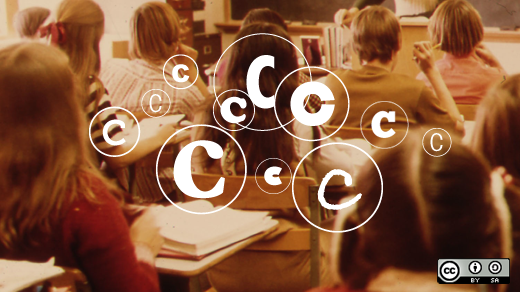Open curriculum alternatives to MPAA’s new anti-piracy campaign for kids.
It has come to our attention that the Motion Picture Association of America, the Recording Industry Association of America, and top internet service providers are drafting curriculum to teach kids in California elementary schools that copying is wrong, or as the headline on Wired.com reads: "Downloading is Mean!"
This message is way too simple. In this digital age, the most important thing we should be teaching kids is to be creative and take full advantage of all the web has to offer. Copyright, asking permission, open licensing, and all the other legal nuances, should be seen as secondary (and even complementary) to this purpose. We should be starting the conversation with the things kids can do versus what they can’t do.
In addition to the campaign’s overly simple and negative approach, other issues include the complete absence of fair use from the curriculum—exceptions and limitations to copyright that allow various uses of copyrighted materials for educational, journalistic, and other purposes. Wired.com reports, "Its president, Marsali Hancock, says fair use is not a part of the teaching material because K-6 graders don’t have the ability to grasp it."
Assuming the net generation and their younger counterparts are as dumb as assumed in the above statement, the curriculum still leaves out a crucial and growing part of the Internet landscape—the commons of free and open materials in the public domain and/or released under open licenses that actually encourage copying, redistribution, revision, and remix! In short, everything this simplified anti-piracy campaign is conveniently leaving out in its copyright curriculum for kids.
There is a more balanced approach to educating kids about copyright that includes the alternatives, and here are some organizations and experienced educators who have developed copyright curricula. The following list of resources are open educational resources (OER), licensed under a CC license that enables free and legal reuse, redistribution and remix. In short, stuff that is free and just fine and even great to copy!
Copyright curriculum for kids
Common Sense Media’s K-12 Digital Literacy & Citizenship Curriculum
Common Sense Media has developed a comprehensive K-12 Digital Literacy & Citizenship Curriculum for educators to use in their classrooms. The resources are aligned to Common Core standards and licensed under CC BY-NC-SA.
New Media Rights Copyright FAQ Videos
New Media Rights has developed a series of short Copyright FAQ YouTube videos (because what better way to interact with youth but through YouTube?) answering common questions about copyright and the public domain. These videos are drafted by lawyers and read by students and are licensed under CC BY.
Electronic Frontier Foundation’s Teaching Copyright Curriculum
EFF developed this copyright curriculum for teachers to use in the classroom several years ago to counter campaigns like the one above, proving that topics like fair use can be taught! Teachingcopyright.org is available under CC BY.
Australia’s Smartcopying Guide for Schools
Australia has an official website for its schools regarding copyright for educators and students. However, this website, called Smartcopying, doesn’t just cover Australian copyright law—it also covers open educational resources and Creative Commons licenses. It’s quite the comprehensive resource with lesson plans, info sheets, videos, and more, and is licensed under CC BY-SA. Even if you’re not Australian, these resources are useful if you’re an educator, so check it out at https://www.smartcopying.edu.au/ and navigate using the horizontal menu to the topic of your choice.
National Library of New Zealand’s Free to Mix Guide for Educators
The National Library of New Zealand takes a different approach to copyright education; instead of focusing on what students can’t do, it focuses on what teachers and students can do with its Free to Mix guide. The guide was popular enough to spin off its own remix by CC New Zealand (pdf) with beautifully done graphics. Both versions are licensed under CC BY.
Shared Creations: Making Use of Creative Commons
Emily Puckett Rogers and Kristin Fontichiaro with the University of Michigan created this short and colorful lesson plan book for elementary school teachers that covers copyright, the public domain (even trademarks and patents!), and Creative Commons. This book is short and sweet with age-appropriate activities (that are even fun for adults). You can browse the book for free online or purchase a hard copy at the publisher’s website. The book is licensed CC BY-NC-SA.
School of Open’s Copyright 4 Educators
The School of Open, a community of volunteers around the world providing free education opportunities on the meaning and impact of openness in the digital age, offers an online course called Copyright 4 Educators. While this course (offered as adapted to both US and AUS law, but open to anyone) is primarily designed for educators and not kids, teachers can take what they’ve learned and then relay it to their students. The School of Open also offers more kid-friendly resources such as Get CC Savvy, Teach someone something with open content, and numerous lesson plans and activities integrated in CC for K-12 Educators. All School of Open courses on the P2PU platform are licensed under CC BY-SA; others hosted elsewhere may be licensed under CC BY.
This list is not exhaustive; if you know of other copyright education resources, please share them below! And if you would like to contribute to providing free copyright, OER, or CC education opportunities for kids (or adults), please join the School of Open community in its efforts! Visit https://schoolofopen.org/ to get started.
Originally posted on the Creative Commons blog. Reposted using Creative Commons.







6 Comments